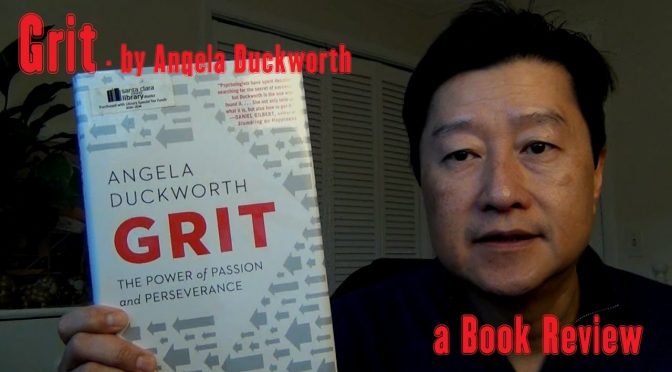I listened to the audiobook a couple of months ago. It’s so good to know scientifically that efforts or “grits” plays a bigger role in a person’s success than talents. In this book, Angela Duckworth showed that through research, observations, and convincing evidences that the right approaches to raising a successful kid is to raise their “grit.” I think I had concluded long time ago that effort or “grit” plays a bigger factor than talent but it’s definitely easier when you’ve got talents and being modest about it by applying extra effort to be successful.
The book basically started out showing you what grit is and why it matters (Part I). Then the author shows you how to grow grits from inside out through interest, practice, purpose and hope. Next she shows you how to grow grit from outside in via parenting for grit, playing fields, and culture.
This is a very informative book for those who want to succeed and want their loved ones to succeed in life.
Short Summary:
Part I: What grit is and why it matters
By author’s definition, to possess grit is to have two characteristics: 1) unusually resilient and hardworking (perseverance), 2) know in a deep way what they wanted (passion). The author chose as examples the West Point cadets training and success rate, spelling bees contest, and his growing up and career choices (management consultant to inner city middle-/high-school teacher to being a psychology researcher. Can talents be distracting? Yes, because it came too easy for them. The author came up with an equation: talent x effort = skill, skill x effort = achievement, this means that talent x effort^2 = achievement. Might want to try the treadmill test.
How to grow more grit? It takes both nature (genes) and nurture (experience). The Flynn effect explains why as a species, we’re getting bettery in abstract reasoning. All of us are getting smarter (higher IQ) due to the social influence. To grow grit, you need to first have an interest, then practice, purpose, and finally hope. More on the four in Part II.
Part II: Growing grit from the inside out
Interest: “Passion for your work is a little bit of discovery, followed by a lot of development, and then a lifetime of deepening.” Interests are NOT discovered through introspection but are triggered by interactions with the outside world, supported and encouraged by your loved ones, teachers or peers. “Sample” your interests first like an athletes before focusing on one or two interests. The author cited several stories including those of Jeff Bezo’s upbringing, Will Shortz, the crossword puzzle master. Follow your passion but it’s helpful to understand how passions are fostered – keep on experimenting.
Practice: “Continuous improvement” or Kaisen is the key to practice – look forward and grow. The average of 10K hours over 10 years seems to be the norm to be a world expert. It takes “deliberate practice” according to Ericsson’s research 1) set a stretch goal, 2) full concentration and effort, 3) immediate and informative feedback, 4) repetition with reflection and refinement.
To get to the “flow” experience durin performance, you must have sufficient “deliberate-practices” behavior in preparation.
Purpose: defined as the intention to contribute the well-being of others. The more gritty you are, the more purpose-driven and less pleasure-driver you are. Do you have a job, or a career, or a calling? Keep asking yourself “Why? Why? Why?” It’s suggested that you reflect on how the work you’re already doing can make a positive contribution to society. Also do “job crafting” by thinking about how, in small but meaningful ways, you can change your current work to enhance its connection to your core values.” Lastly, find inspiration in a purposeful role model? In author’s case, it’s her mom.
Hope:: Taking a chapter from Carol Dweck’s Mindset book, learn the “growth” mindset rather than the “fixed” mindset. Having a feeling of control (or hope) in spite of difficulties at young age could help develop grit. Need to learn how to succeed as well as how to fail. Author recommends going from “growth mindset” to “optimistic self-talk” then to “perseverance over adversity.” Of course, having someone to encourage you goes a long way.
Part III: Growing grit form the outside in
Parenting for grit:: Ex-49er, Steve Young’s upbringing provides a grit example: his father taught him not to give up too easily in making the baseball and football team. “Endure to the end,” his father, Grit Young said. Be the wise parent: demanding and supportive. Commit to Hard Thing Rule: pick a hard thing and try to do your best.
Culture of Grit: Seattle Seahawks’ head coach, Peter Carroll builds a culture of grit.
Ted Talk:
Talks at Google:

